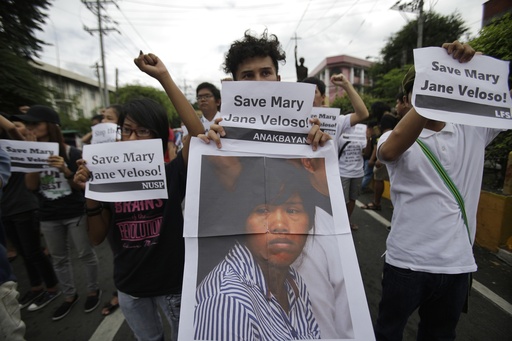
In a significant development, Philippine President Ferdinand Marcos Jr. announced that an agreement has been finalized for the return of a Filipino national who has been sentenced to death in Indonesia for drug-related offenses. This announcement comes after years of vigorous advocacy from the Philippine government for the repatriation of Mary Jane Veloso, who narrowly escaped execution by firing squad thanks to these ongoing efforts. Marcos expressed gratitude to Indonesian President Prabowo Subianto and his administration for responding positively to this longstanding appeal.
Marcos conveyed his joy in a public statement, emphasizing Veloso’s arduous journey since her arrest in 2010 on charges of drug trafficking. He stated, “Mary Jane Veloso is coming home,” highlighting the challenges faced throughout her case. While the precise timeline for Veloso’s return remains uncertain, the president articulated his eagerness to welcome her back to the Philippines.
In Jakarta, Evi Loliancy, the head of Yogyakarta’s female prison, indicated that, as of now, there has been no formal request or directive regarding Veloso’s release. “She will still be under our supervision at the Yogyakarta Correctional Institution until there is a specific order regarding her transfer from the High Prosecutors’ Office,” she remarked.
The agreement hailed by Marcos is seen as a testament to the strong partnership between the Philippines and Indonesia, reflecting mutual commitments to justice and compassion. Specific details surrounding the arrangement have yet to be disclosed. However, if the transfer is executed, it would eliminate the risk of Veloso facing the death penalty in the Philippines, which has abolished capital punishment.
In 2015, Veloso was moved to a prison on an island where she was among nine others scheduled for execution. Despite international protests from various countries including Australia, Brazil, France, Ghana, and Nigeria, Indonesia went ahead with the executions of the other convicts.
Veloso’s plight has galvanized public support in the Philippines, where many believe she is innocent, claiming she had no knowledge of the heroin concealed in her suitcase, which was discovered upon her arrival in Indonesia. Her circumstances, which involve a desperate journey initiated by her godsister promising her a job, have drawn poignant parallels to social issues faced by many Filipinos.
Marcos remarked on Veloso’s narrative as emblematic of numerous women in the Philippines, describing her as “a mother trapped by the grip of poverty, who made one desperate choice that altered the course of her life.” He argued that while she must face the consequences of the law in Indonesia, she is also a victim of her unfortunate circumstances.
The Philippines has identified itself as a significant provider of labor internationally, with many women seeking work abroad due to dire economic conditions at home. Despite efforts by Philippine authorities to protect these workers, reports of ongoing exploitation and abuse persist, particularly among Filipina domestic helpers. Currently, at least 59 Filipinos abroad are facing the death penalty, primarily for drug-related and murder offenses, as reported by the Department of Foreign Affairs in Manila.
